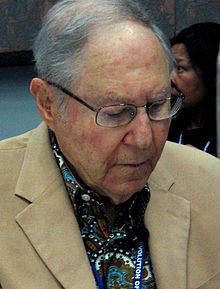William Glasser
American psychiatrist (1925–2013)
William Glasser M.D. (born May 11, 1925 - August 23 2013) was an American psychiatrist. He is the developer of reality therapy and choice theory.

Quotes
editChoice Theory (1997)
edit- Brain drugs may make us feel better, but they do not solve the problems that led us to feel miserable
- p. 4
- We almost always have choices, and the better the choice, the more we will be in control of our lives.
- Beware of getting involved with people who seem to be able to feel good but have no close friends. They may be witty and fun to be around, but their humor is all put-downs and hostility. If you marry such a person, you will soon be the recipient of that hostile humor and may regret it for the rest of your marriage....Someone who does not have good friends does not know how to love.
- p. 30
- [Reality Therapy] is based on choice theory and focuses on improving present relationships, almost always disregards past relationships, and depends for its success on creating a good relationship between the client and the counselor.
- p. 62
- When a client says, It's hard to say, he usually knows what's really going on but doesn't want to talk about it....I break through that reluctance by acting as if it wasn't there. 'Well, say it anyway. This is the place to say hard-to-say-things.
- p. 65
- When we depress, we believe we are the victims of a feeling over which we have no control.
- [p.70]
- To be depressed or neurotic is passive. It happened to us; we are its victim, and we have no control over it. This use of nouns and adjectives makes it logical for us to believe that we can do nothing for ourselves...but you are capable of choosing something better. If it is a choice, it follows that you are responsible for making it. With verbs, you are not a victim of mental illness; you are either the beneficiary of your own good choices or the victim of your own bad choices. You are not ill in the usual sense of having the flu or food poisoning. A choice theory world is a tough responsible world; you cannot use grammar to escape responsibility for what you are doing.
- p. 75
- Such people who choose to depress are not mentally ill; their brain chemistry is not abnormal. It is changed from what it is when they are happy, but that change is perfectly normal for the total behavior, depressing, they are choosing....The brain chemistry no more causes his depressing than sweating causes running. It is the choice to depress or to run that results in both.
- p. 85
- We would be much better off getting rid of the psychology that is causing so much misery than looking for chemicals that make us feel better but do nothing to solve our loneliness.
- p. 88
- Drugs provide pleasure; they cannot provide happiness. For happiness, you need people.
- p. 88
- If you depend on the widespread lover's delusion, 'With my love he or she will change,' you have little chance to help yourself. This delusion is external control to the maximum. If things are not good from the beginning, they are very likely to change, but not for the better.
- p. 105
Unhappy Teenagers A Way for Parents and Teachers to Reach Them (2002)
edit- Your teen may be weaker, but he is not without the ability to do himself and others a lot of harm by showing you that you can't control him at school or anywhere else when he is out of your sight....[W]hen he is on his own, your only control over him is the strength of your relationship.
- p.9
- The Seven Deadly Habits of External Control: Blaming, Criticizing, Complaining, Nagging, Threatening, Punishing, and Bribing (Rewarding to Control).
- The most destructive habit [to relationships] is criticizing; next comes blaming, but any of the habits are more than capable of disconnecting you from a person you want to be close with.
- p.14